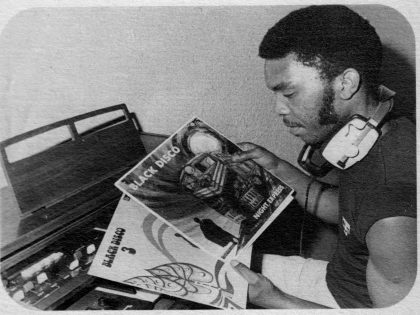Lady Gaga lives in Lagos
Goldie’s allusions to madness typify a common theme present in the music of many of today’s successful female artists.

A still from "Don't Touch."
The video for Goldie Harvey’s new single “Don’t Touch,” opens in black and white, on a pair of bejeweled lips. A rapid sequence of images reveal a female dancing in a glow-in-the-dark corset and frilled mask; star-shaped glasses à la Elton John; barely-discernible spiderwebs twitching around the whites of crystal-rimmed eyes. Next we are looking into a padded room with illegible words scrawled on the glass in lipstick—the ravings of an insane woman—Goldie is shoved in, straightjacketed and dirty, with her hair teased into disarray. It’s not hard to see why some refer to the Nigerian pop star as the “African Lady Gaga.”
In the video, which was shot in Lagos and directed by Clarence Peters, Goldie chants “don’t touch my body” to a swift electric beat while moving through a collection of unpredictable scenes, each one stranger than the last. Goldie is an ancient Egyptian pharaoh, an angel, and a circus ringleader; she sports a red feather-and-sequined headdress and then plays assistant to a knife thrower. Several times in the video Goldie is shown wearing a leather corset and lace stockings, posing in front of what could easily have been a left-over set dressing from the last Tron film.
“Don’t Touch” is erratic and obscure but for a reason; the stream-of-consciousness style composition highlights an overarching element of insanity. Like Rihanna’s high-speed convulsing in “Disturbia,” or Lady Gaga’s rigid fingers and white-tiled walls in “Bad Romance,” Goldie’s allusions to madness typify a common theme present in the music of many of today’s successful female artists.
In the age of the viral video, where everyone is competing for hits and shameless poise is the ultimate goal, female empowerment still comes with the caveat that the woman must be at least a little bit crazy. Not necessarily bad nor incontrovertibly good, artists like Gaga and Rihanna have helped popularize the hot, edgy, slightly unstable female persona (“gaga” is literally a synonym of “insane”). Goldie embodies the role with relish, enticing unseen males under the guise of seduction, she breathes “come on boy,” just before pumping the breaks.
Like “Disturbia” and “Bad Romance,” Goldie’s track is lyrically simple but visually complex, and equally fun to listen to. Just remember, no touching.



















